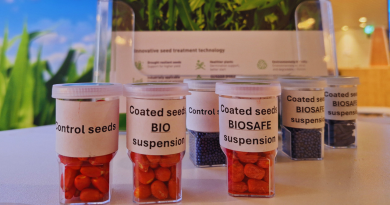Kenya Unveils Cooling Action Plan to Address Climate Change and Sustainability
By Chemtai Kirui | phillykirui@gmail.com
Kenya has announced its ambitious five-year plan to combat greenhouse gas emissions caused by refrigeration appliances. The plan, titled the 2023 to 2027 National Cooling Action Plan for Kenya (NCAP), aims to enhance the availability and accessibility of sustainable cooling solutions, and was officially unveiled at a prominent Nairobi hotel on Wednesday. The event was graced by Environment and Climate Principal Secretary, Eng Festus Ng’eno, who expressed his belief that the plan would propel the country towards a “green, cool revolution.”
Eng Ng’eno emphasized the importance of the NCAP, stating, “With this plan in place, we are charting a course towards a more efficient, eco-friendly, and inclusive Kenyan refrigeration and air-conditioning sector. Our goal is clear: to make sustainable cooling accessible for every Kenyan by using efficient appliances, environmentally-safe refrigerants, and enhancing access to agricultural cold chains.”
National cooling refers to the collective efforts of a country to manage and regulate its cooling systems, including refrigeration and air-conditioning, with a focus on sustainability, energy efficiency, and climate change mitigation. It encompasses strategies, policies, and initiatives aimed at reducing greenhouse gas emissions, promoting the use of environmentally-friendly technologies, and ensuring equitable access to cooling services.
For Kenya, the National Cooling Action Plan (NCAP) holds significant importance as it aligns with the country’s commitment to combat climate change and achieve sustainable development.
NCAP serves as a vital component of Kenya’s broader climate change mitigation strategy, aiming to transition the country to a low-carbon development pathway. Eng Ng’eno stressed that full implementation of the plan would enhance the performance and energy efficiency of cooling appliances, facilitate the transition to climate-friendly refrigerants, and increase access to agricultural cold chains.
The unveiling of the NCAP signifies Kenya’s commitment to mitigating climate change and meeting its global climate action obligations. Eng Ng’eno highlighted the nation’s pledge to reduce greenhouse gas emissions by 32% or 143 million metric tons of CO2 equivalent by 2030, as outlined in Kenya’s Nationally Determined Contributions (NDC). He emphasized that conventional cooling services pose a significant challenge to achieving this ambitious target.
Developed by the State Department for Environment and Climate Change, NCAP is designed to create favorable conditions for the adoption of sustainable cooling systems. Eng Ng’eno stated, “We are talking about providing financial incentives for cold storage systems and making sure everyone understands the incredible benefits of zero-emission cold-chains. The action plan will also support research and development that suits our unique local needs. Our goal is to make innovative business models easily accessible to everyone.”
Access to cooling services is vital for various sectors of the economy, including agriculture, healthcare, and manufacturing. By promoting sustainable cooling solutions, the NCAP ensures that Kenya’s development goals are achieved while minimizing environmental impacts. It supports the transition towards a low-carbon development pathway, balancing economic growth with environmental sustainability.
Eng Ng’eno took the opportunity to acknowledge and commend stakeholders within the refrigeration, air-conditioning, and cooling systems sector for their growing embrace of sustainable cooling solutions. He urged them to collaborate with the government in the successful implementation of NCAP, stating, “I urge all stakeholders to actively engage and collaborate in implementing NCAP. By integrating the actions outlined in this document into your institutional framework, we can collectively achieve its goals and make a significant impact.”
The development of NCAP was a collaborative effort involving key stakeholders from the cooling sector, including the private sector, academia, state actors, and non-state actors. Several development partners supported its formulation, notably the Government of Germany through GIZ’s Green Cooling Initiative, Collaborative Labeling and Appliance Standards Program (CLASP), and Sustainable Energy for All (SEforAll).
The National Ozone Unit within the Multilateral Environmental Agreements (MEAs) Directorate, headed by Mr. Kirui Marindany, coordinated NCAP’s development at the State Department for Environment and Climate Change, with Mr. Cyrus Mageria leading the MEAs division.
This National Cooling Action plan serves as a comprehensive strategy to address the environmental, social, and economic challenges associated with cooling systems in Kenya.




